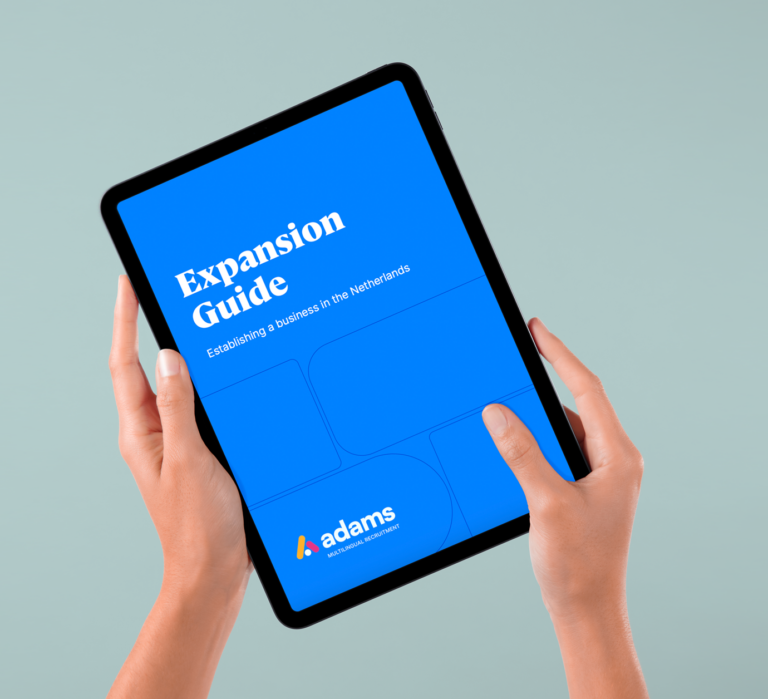Expand your business to the Netherlands successfully 🌷
We’ve recruited numerous teams for international businesses entering the Dutch market. Their most significant challenge? A lack of straightforward, practical guidelines for establishing a company here.
Thus, we created this guide — to streamline your expansion into the Netherlands!
Table of Contents
- Checklist for setting up your business
- The legal frameworks for establishing a business
- Financial aspects
- Setting up an office
- The tax system in the Netherlands
- Workforce & working culture
- 30% ruling
- Visa sponsorship
and to apply it all!

Or find a preview of what will await you in the ebook below ⬇

Why choose the Netherlands for your company expansion?
The Netherlands, renowned for its business-friendly environment and strong economic stability, stands out as an excellent choice for your company expansion.
Strategic location and connectivity
The Netherlands serves as a gateway to a market of 244 million consumers within 1000 kilometers. With exceptional transportation infrastructure, including the Port of Rotterdam and Amsterdam Airport Schiphol, the country offers unparalleled international trade and logistics connectivity.
Stable and open economy
The Dutch economy ranks as the world’s 8th freest in the 2023 Index and repeatably scores high in global comparisons of competitiveness and ease of doing business. Overall, the transparent and stable nature makes the country an appealing investment hub for foreign investors.
Highly educated and multilingual workforce
English proficiency is exceptionally high in the Netherlands (ranking as the highest level of non-native English speakers worldwide in 2022). Furthermore, the Dutch nation is known for its comprehensive education system, resulting in a workforce that is not only multilingual but also highly skilled.
Innovation and research ecosystem
Ranking 4th on the 2022 European Innovation Scoreboard – the Netherlands actively promotes innovation and supports research and development. Hence, the country has a well-established network of research institutions, universities, and innovation hubs that encourage collaboration between academia and industry. Additionally, the government offers attractive incentives for research and innovation activities.
Access to international markets
Expanding to the Netherlands provides companies with access to the European Union’s vast single market, offering a customer base and supply chain integration across borders. Furthermore, the country’s membership in the EU and its extensive network of trade agreements make it an ideal launchpad for companies targeting the European market.
Thriving startup ecosystem
Expanding to the Netherlands provides companies with access to the European Union’s vast single market, offering a customer base and supply chain integration across borders. Furthermore, the country’s membership in the EU and its extensive network of trade agreements make it an ideal launchpad for companies targeting the European market.
Sustainable and green initiatives
The Dutch government plans to reduce the Netherlands’ greenhouse gas emissions by 49% by 2030 (compared to 1990 levels) and achieve a 95% reduction by 2050. With significant investments in sustainable technologies and renewable energy, the Netherlands leads the way in offshore wind energy, circular economy practices, and green transportation.

17th
Largest economy

1,995.00 €
Minimum salary (gross)

17,6 million
Population

90%
English-speaking population
Contracts & Dutch labour laws
A CAO or CLA (Collectieve Arbeidsovereenkomst / Collective Labour Agreement) is a written agreement between an employer and its employees that covers working conditions and benefits.
Contract forms in the Netherlands
In the Netherlands, employment contracts can be either for a definite (temporary) or an indefinite (permanent) period.

Types of contracts in the Netherlands
- Temporary or fixed-term contracts have set start and end dates. If this contract is renewed three times or the employee has been working for the same employer for three years, the contract automatically becomes a permanent one (unless a Collective Labour Agreement states otherwise).
- Permanent or indefinite contracts do not have an end date. They provide greater job security and are considered more desirable by many employees.
Advantages of temporary contracts with a recruitment agency
The employee does the work for your company, but the employment contract is signed with the agency, who becomes the legal employer. This way, the employee can have multiple contracts without gaining the right to a permanent one, especially useful for short-term projects. There are three different temporary agency contract types, each depending on the duration of the employment relationships:
- Phase A
Phase A lasts for a maximum of 52 worked weeks and offers the greatest flexibility for an employer as multiple contracts are allowed. Unless stated otherwise, the agency only pays employees the wages for the hours worked. - Phase B
If employees continue working for the company within six months after concluding a phase A contract, they can enter into a Phase B contract. These contracts can last as long as three years, or a maximum of six fixed-term secondment agreements within the same time frame. - Phase C
If employees continue working for the company within six months after concluding a final phase B contract, they can enter into a Phase C contract. These contracts last indefinitely and are based on a secondment agreement.
Hire your first team in the Netherlands
With over 26 years of expertise in the Dutch market, we are experts in hiring for international companies across a wide range of industries. Let us assist your business in successfully entering the Netherlands by finding and establishing your first team here!
Contents of a Dutch employment contract
-
The Dutch Working Hours Act stipulates that workers aged 18 and above can work up to 12 hours a day and 60 hours a week.
However, this isn’t the standard for every week. Instead, the maximum average work hours are limited to:
• 48 hours across a span of 16 weeks, or
• 55 hours within a continuous period of up to 4 weeks
Nevertheless, it is common practice to work 8 hours a day, five days a week (40 hours in total).
-
The trial periods are determined by the contract’s duration. For contracts of 6 months or less, no trial period is applicable.
Contracts between 6 months and 2 years typically include a 1 month trial period. For contracts extending beyond 2 years, a 2 month trial period may be instituted.
This period allows both the employer and the employee to determine whether the position is a good fit.
-
Dutch law provides strong protections against dismissal.
In most cases, employers must obtain permission from the UWV (Employee Insurance Agency) or the court to terminate an employment contract.
-
If an employee is unable to work due to illness, Dutch law requires employers to continue paying at least 70% of their salary for up to two years.
-
The Netherlands has stringent laws against discrimination in the workplace.
Employers are obliged to provide equal treatment irrespective of race, gender, religion, age, sexual orientation, or disability.
-
Employers are required to ensure a safe and healthy working environment.
They must carry out a risk inventory and evaluation and have a prevention officer in the organization.
-
The Netherlands has a three-pillar pension system. The first pillar is the state old-age pension (AOW), the second pillar comprises supplementary pension schemes organized collectively by sectors of industry and the third pillar involves individual pension products.
As an employer, you are often required to contribute to the second pillar, providing your employees with an occupational pension scheme.
The exact requirements depend on the industry you’re operating in.
-
The minimum salary starting 1 July 2023 in the Netherlands is €1,995 gross per month for persons 21 and older. The required minimum salary is lower for younger workers.
Please note that these figures can fluctuate depending on industry, experience, and specialized skills. See the average range for salaries depending on the industry.
